Intel Dual Core Performance Preview Part I: First Encounter
by Anand Lal Shimpi on April 4, 2005 2:44 PM EST- Posted in
- CPUs
Business Application Performance
Business Winstone 2004
Business Winstone 2004 tests the following applications in various usage scenarios:- Microsoft Access 2002
- Microsoft Excel 2002
- Microsoft FrontPage 2002
- Microsoft Outlook 2002
- Microsoft PowerPoint 2002
- Microsoft Project 2002
- Microsoft Word 2002
- Norton AntiVirus Professional Edition 2003
- WinZip 8.1
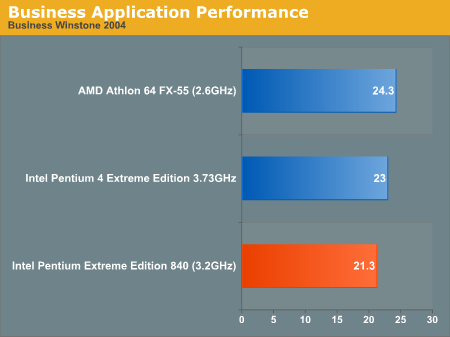
There's no surprise here - your best business application performance is going to come from a very fast single core CPU.
Office Productivity SYSMark 2004
SYSMark's Office Productivity suite consists of three tests, the first of which is the Communication test. The Communication test consists of the following:"The user receives an email in Outlook 2002 that contains a collection of documents in a zip file. The user reviews his email and updates his calendar while VirusScan 7.0 scans the system. The corporate web site is viewed in Internet Explorer 6.0. Finally, Internet Explorer is used to look at samples of the web pages and documents created during the scenario."

The next test is Document Creation performance:
"The user edits the document using Word 2002. He transcribes an audio file into a document using Dragon NaturallySpeaking 6. Once the document has all the necessary pieces in place, the user changes it into a portable format for easy and secure distribution using Acrobat 5.0.5. The user creates a marketing presentation in PowerPoint 2002 and adds elements to a slide show template."
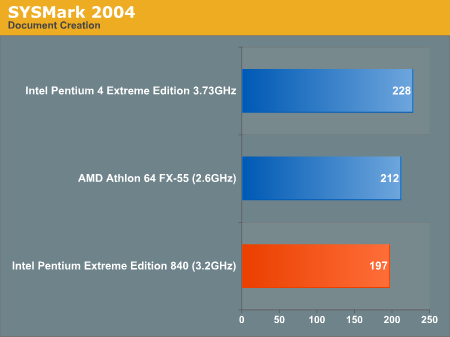
The final test in our Office Productivity suite is Data Analysis, which BAPCo describes as:
"The user opens a database using Access 2002 and runs some queries. A collection of documents are archived using WinZip 8.1. The queries' results are imported into a spreadsheet using Excel 2002 and are used to generate graphical charts."
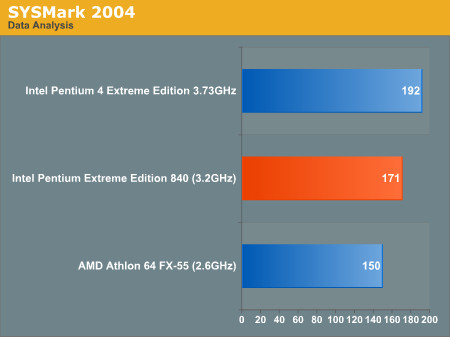
The Office Productivity SYSMark 2004 suite shows some benefit to dual core, given that there is quite a bit of multitasking involved in the test suite. Despite the multitasking, the Pentium Extreme Edition running at 3.2GHz isn't able to trounce its single core 3.73GHz relative.
Business Winstone 2004 includes a multitasking test as a part of its suite, which does the following:
"This test uses the same applications as the Business Winstone test, but runs some of them in the background. The test has three segments: in the first, files copy in the background while the script runs Microsoft Outlook and Internet Explorer in the foreground. The script waits for both foreground and background tasks to complete before starting the second segment. In that segment, Excel and Word operations run in the foreground while WinZip archives in the background. The script waits for both foreground and background tasks to complete before starting the third segment. In that segment, Norton AntiVirus runs a virus check in the background while Microsoft Excel, Microsoft Project, Microsoft Access, Microsoft PowerPoint, Microsoft FrontPage, and WinZip operations run in the foreground."
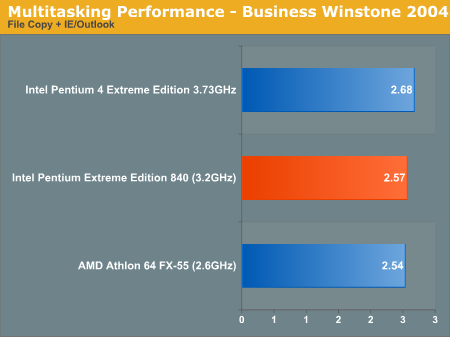
The performance of the dual core Extreme Edition comes within 5% of the 3.73GHz EE, despite the fact that the single core chip has a 16% clock speed advantage, but it is still slower overall.

The second test finally shows something positive for the dual core chip, with a negligable 2% performance lead. This is the perfect example of how multi-core can be a substitute for clock speed when it comes to performance. Note that despite the Pentium Extreme Edition being faster than the 3.73EE, the single core Athlon 64 FX-55 is faster than both.

The third and final test also shows a slight performance advantage for the dual core Extreme Edition, even over the Athlon 64 FX-55.
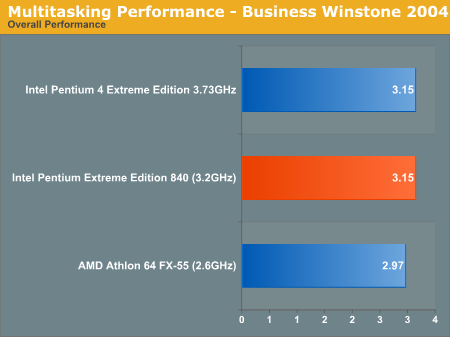










141 Comments
View All Comments
Hans Maulwurf - Monday, April 4, 2005 - link
#27 thats because these benches are opted for HT and dual core. Everybody should know they are not typical for usage of a desctop PC.Maybe dual core will be a good thing, but to value its implementation you have to compare it to, for example, a dual Xeon.
If I would take this review seriously we all should have buyed dual CPU systems some time ago. But some time ago nobody could show dual CPU desctop systems are useful.
Why did this change so radicially? Is it really the way we use our computers or is it just the way you benchmark when allowed to be one of only very few Intel-previewers?
Son of a N00b - Monday, April 4, 2005 - link
#11, next time label you post with *Caution Fanboy Post* so I do not waste my time reading your comments that are biased and misinformed...w0w! great preview, I cannot wait until six months from now you doing a head to head match up with SLI, dual core cpu rigs from both AMD and Intel....it should be very interesting indeed....Cannot wait to see what AMD's performancee is...it could go either way....
Anyway great article, keep up the great work that keeps us all coming back, it must be hell to come up with new benchmarks for these systems.
w00t go anandtech and dualies!
MaxisOne - Monday, April 4, 2005 - link
Hey Not even 1 Game Benchmark ? and wheres the temps ??MaxisOne - Monday, April 4, 2005 - link
cbuchach - Monday, April 4, 2005 - link
I think these are the first benchmarks I have seen where Hyperthreading was shown to make a significant performance difference outside of video encoding tasks or a few other specialized apps.Overall I think Hyperthreading amongst the enthusiast community has never held much worth mostly because it has little impact on gaming performance. But these benchmarks clearly show in my eyes that whether it be the single-core/hyperthreading or dual core chips, Intel is the way to go. I of course am not a big gamer but nonetheless most computer users, especially power users at least do some moderate multitasking. Having two virtual or real cores really does improve the computing experience up unitl this point, in mostly immeasurable ways.
redpriest_ - Monday, April 4, 2005 - link
When can I buy one? =PThese previews will probably be followed up by shipping versions 6 months from now.
AtaStrumf - Monday, April 4, 2005 - link
WAU this was a shocker! Sure didn't expect dual cores so soon.Great preview Anand! It covered all of the areas I was interested in and it basicly confirmed all my expectations.
It seems that one thing that can still bring dual cores to a grind is the I/O bottleneck. With everything going dual lately and with RAID controllers being as common as USB ports and HDDs being pretty cheap, I think it's time you retested how much of an impact RAID can have on desktop performance. If I remember correctly it was you who said that RAID made no sense on desktop, which essentially killed my burning desire to get one. What about now? If we're going dual we might as well go all out.
tynopik - Monday, April 4, 2005 - link
try running stuff with software raid5 eating up cpu cyclesBeenthere - Monday, April 4, 2005 - link
Hyperthreading does NOT significantly improve system performance unless the software is written for hyperthreading and there is damned little of that currently available. Dual core when execurted properly offers a considerable performance advantage. Intel's cobbled mess is sure to be a nightmare and when all the facts are known it will be impossible to conclude otherwise despite the cheerleading of the media.sri2000 - Monday, April 4, 2005 - link
#14 - As you say the enterprise market is where multi-processor rigs live (whether dual-cpu or dual-core), it's also where dual-core makes it's best financial case.ie. when Microsoft came out to say that their software license pricing will treat a dual-core cpu as a single processor (as opposed to pricing it as a dual-proc), that really gives businesses (especially small ones with tight budgets) a great incentive for getting dual-core servers (not to mention for those who're using Linux).
And since AMP will get dual-core Opterons out ahead of dual-core Xeons, it's an opportunity to get some nice growth in their small business server market share.